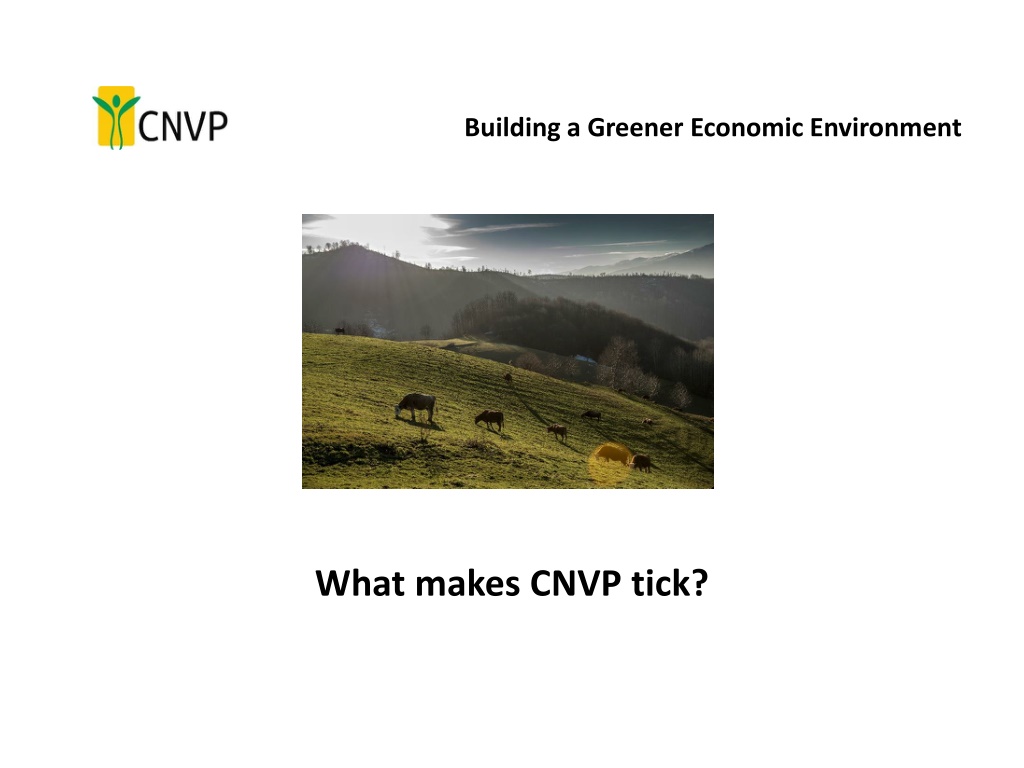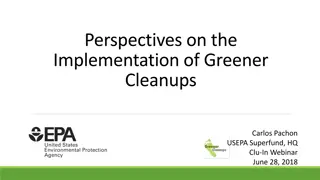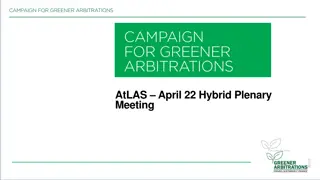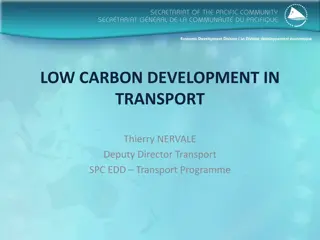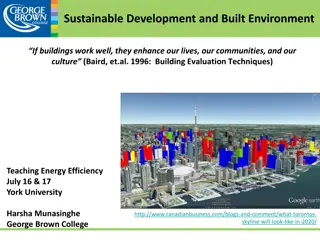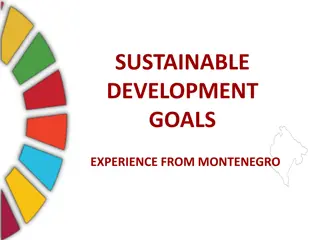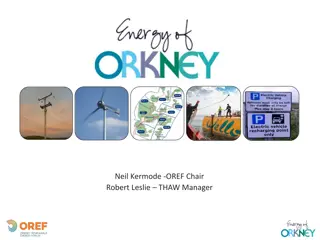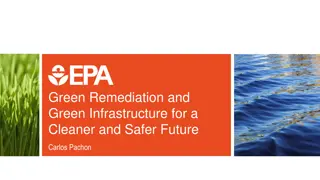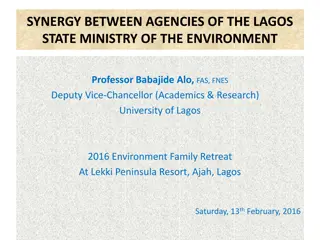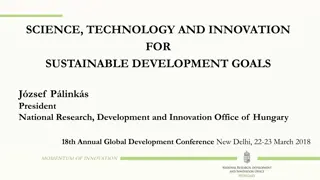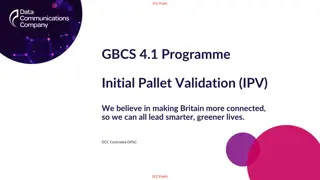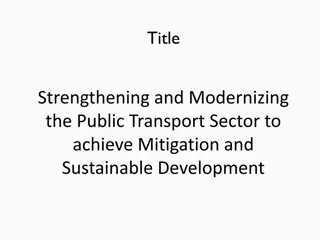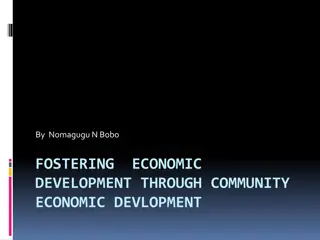CNVP - Building a Greener Economic Environment through Sustainable Development
CNVP focuses on agri-rural, forestry, and renewable energy activities in Balkan countries to achieve sustainable development, reduce environmental risks, and address key issues like water provision and waste management. Their team-based approach and key areas of capacity strengthening contribute to evidence-based solutions for improving livelihoods in rural communities affected by environmental and climate change.
Download Presentation

Please find below an Image/Link to download the presentation.
The content on the website is provided AS IS for your information and personal use only. It may not be sold, licensed, or shared on other websites without obtaining consent from the author. Download presentation by click this link. If you encounter any issues during the download, it is possible that the publisher has removed the file from their server.
E N D
Presentation Transcript
Building a Greener Economic Environment What makes CNVP tick?
Key points about CNVP: Focuses on agri-rural, forestry and renewable energy activities that will reduce environmental risks and ecological scarcities, as well as achieve sustainable development without degrading the environment i.e. the Green Economy. Addresses issues of: unsafe water provision, sanitation and drainage; inadequate solid and hazardous waste management; and air pollution, including uncontrolled emissions from motor vehicles, factories and low grade domestic fuels i.e. the Brown Agenda. Is active in all Balkan countries (Macedonia, Kosovo, Albania, Montenegro, Serbia and Bosnia Herzegovina), with a view to working in Turkey, the European Neighbourhood Space and the MENA area. Works with stakeholders and partners in the public, private and civil society sectors at central and decentralised levels. Applies a team-based approach that incorporates innovative ideas into decision-making processes and systems to achieve targeted results.
Key CNVP skills: CNVP has built an international reputation as a facilitator. It uses tried and tested analytical, consulting, advisory, coaching, mentoring, demonstration and knowledge transfer skills to achieve long-term sustainability of development activities. As a civil society organisation, CNVP helps partners to strengthen their technical capacity through the implementation of in-country, cross-border and regional cooperation projects. Its 26 employees are supported by an extensive and expanding team of Associate Experts who are specialists in key fields related to CNVP s main activities.
CNVPs Mission: Use evidence-based analysis to improve the sustainable livelihoods of Balkan rural communities affected by ongoing environmental and climate change.
Six key areas of CNVP capacity strengthening: 1. Sustainable forest management 2. Climate change, environment and NRM 3. Agri-rural development 4. Renewable energy and waste management 5. Community mobilisation 6. European accession issues and related policy questions
1. Sustainable forest management Multi-functional systems for farmer-focused forestry (small-scale, private or communal) to develop forest production, utilization and monitoring Forest governance and legislative reform, including evidence-based forest policy, decentralized forest management and joint forest management Forest certification capacity building to improve forest governance, strategic planning and decision-making Development of timber/non-timber forest product value chains through the improved organization of producers/collectors Agro-forestry, inter-cropping, permaculture and silvi-culture, as well as forestry and orchard establishment/management Innovative forest practices and use of appropriate technology, including GIS and GPS surveys, as well as drones Reform the legal and institutional frameworks for the forest sector Civil society monitoring to improve forest protection, overcome illegal logging, reduce corruption and enhance government accountability National timber tracking and revenue collection systems, and satellite monitoring of forests to improve law enforcement Build SME forest enterprises capacity to help them comply with laws and regulations of the formal sector
2. Climate change, environment and NRM Climate change mitigation measures and environmental impact assessments (EIAs) Disaster risk reduction (illegal logging and sand/gravel extraction, as well as soil erosion and excess flooding), and national/local food security Sustainable natural resource management (NRM), including forest inventories, as well as the efficient use and conservation of water, including transboundary pollution Support for green infrastructure, nature conservation, bio-diversity and eco-system restoration, including national parks and other protected areas Land use, tenure and consolidation, including watershed management Improved land management and consolidation, including securing property rights through the use of participatory mapping
3. Agri-rural development Job creation, income generation and improved rural livelihoods through better market access Support for all activities along agri-rural and forestry value chains production, processing, storage, transport and sale to domestic and export markets Certification of organic agriculture Support for high value-added agriculture, eco-tourism and rural diversification Promotion of area-based development, including mountain areas
4. Renewable energy and waste management Replacement of fossil fuels with renewable energy, particularly wood biomass, short rotation crops and bio-energy production Monitoring opportunities for other forms of renewable energy in rural areas e.g. geo-thermal, solar, wind, mini-hydro and tidal Increased use of carbon sequestration, energy audits and carbon credits Management of household and industrial waste
5. Community mobilisation Empowerment of rural women - building ownership and trust Development of private and communal forest and pasture owner/user associations Strengthening organisations and supporting institutional development, including multi- stakeholder processes, advocacy and lobbying Promotion of democratic governance Development of local action groups (LAGs) based on LEADER principles
6. European accession issues and related policy questions Application of EU standards in agri-rural and forestry development Approximation of national legislation within the EU accession context Use of policy simulations, particularly related to Chapter 11 (Agriculture) and Chapter 27 (Environment) of the acquis communautaire Development of evidence-based Green Economics , budget support for the environment sector, and green financing Implementation of measures in Agriculture and Rural Development Programmes for 2014-20 funded through IPARD II and the European Neighbourhood Instrument
Key stakeholders Central government and municipalities Private sector, including forest and pasture owner/user associations Forest and environmental protection agencies Producers organisations and women s groups Agriculture and forestry cooperatives Local communities, NGOs, CSOs and LAGs Universities and research institutions International organisations, including multilateral and bilateral development partners
CNVP works with municipalities to improve: 1. evidence-based strategic sector reviews, annual and medium term budget analysis, and identification of alternative sources of funding 2. land registration and land consolidation 3. fast growing forest plantations, and use of wood bio-mass for public buildings 4. nature conservation, including protection against soil erosion and fire prevention on forested lands, as well as support for national parks, protected areas and other area- based conservation measures at local level 5. transboundary (water/air) pollution, including rehabilitation of damaged land 6. waste management (household/industrial), as well as production of energy from waste and sewage 7. rural infrastructure, including improved water supply (for better community health) 8. technical, social and physical management skills of municipality staff 9. consultancy and incubator support for the promotion of SMEs 10. service delivery for development of mountain area rural/eco-tourism service delivery, based on cluster policy 11. awareness of municipality staff, local civil society and schoolchildren concerning environment/climate change
CNVP works with the private sector to: Create public-private partnerships Promote social entrepreneurship Apply corporate social responsibility
CNVP works with the private sector, (as well as central government, municipalities and other partners), in the following areas: climate change mitigation measures and environmental impact assessments (EIAs), as well as raising awareness on issues related to climate change; disaster risk reduction (illegal logging and sand/gravel extraction, as well as soil erosion and excess flooding), avoidance of transboundary pollution, and national/local food security; sustainable natural resource management, including watershed management; support for green infrastructure, nature conservation, bio-diversity and eco-system restoration, including national parks and other protected areas; sustainable land management, including land tenure and land consolidation, as well as securing property rights through the use of participatory mapping; sustainable forest management, including forest certification; replacement of fossil fuels with renewable energy, particularly wood biomass, short rotation crops and bio-energy production; monitoring opportunities to use other forms of renewable energy in rural areas e.g. geo-thermal, solar, wind, mini-hydro and tidal; increased use of carbon sequestration, energy audits and carbon credits; and management of household and industrial waste.
CNVP can support private sector partners by: representing and promoting them commercially at country and regional level; being a reliable partner in and around the Balkan region; providing inputs to project design, based on local knowledge and sound expertise; supplying key experts and non-key experts; offering high quality project management, financial and monitoring systems; providing technical support to identify, create and support competitive rural business models; supporting the development of agriculture, forestry and energy value chains; facilitating meetings with key public, private and CSO sector stakeholders; gathering data through sample surveys, including field interviews; accessing local translation and interpretation services; providing logistical support through a network of offices in the Balkans; improving communication with the general public and other CSOs about the ongoing EU integration process; and issuing press releases to, and coordinating interviews with, local and regional press/media.
Finally, CNVPs four core values are: Green intervenes to build a greener economic environment within the ongoing process of climate change Clean promotes renewable energy and improved household/industrial waste management Seen operates in the Balkans (now), and aims to be active in the surrounding European Neighbourhood Space and MENA area (future) Lean improves continuously and systematically the efficiency of its service delivery
Thank you for your attention. Building a Greener Economic Environment info@cnvp-eu.org www.cnvp-eu.org
